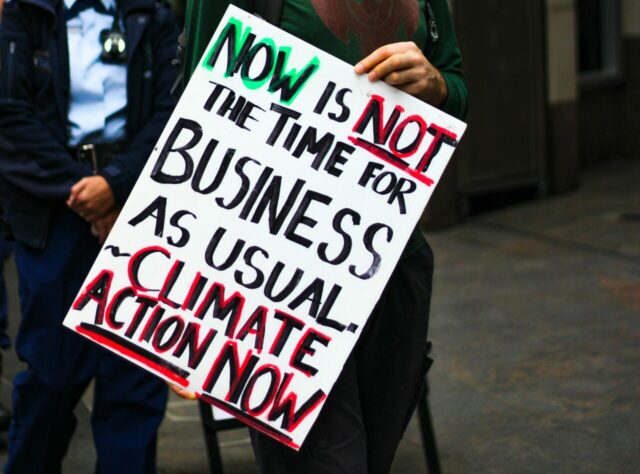
Now is the time for ambitious action on climate change. Credit: Luke White (Unsplash)
The recent announcement by Prime Minister Rishi Sunak of plans to weaken net zero policies related to insulating homes, implementing clean heat and driving the switch to electric vehicles is deeply concerning to all of us who care about our future.
It seems that every day another extreme weather event or record is being experienced somewhere around the world. Climate change is the greatest threat facing us, so mitigation policies need ambitious targets to decarbonise our society, with clear explanations of how they will be met. The rollback of key measures to reach net zero goes directly against the recommendations of the Climate Change Committee (CCC). Their June report found that the policies were already too weak to meet the pivotal and legally binding 2050 target.
This comes at a time when the post-industrial global temperature has risen by 1.2C. Antarctic sea-ice has the lowest winter levels ever recorded, mass biodiversity loss is underway and ocean temperatures are at an unprecedented peak. The disastrous impact of the effects of climate change are felt in the UK in the floods and heat waves that break new records every year. The forest fires, droughts, extreme weather and storms seen across Europe and the rest of the world are set to worsen this winter as El Niño intensifies. Just this week, the UK recorded its joint highest September temperature, something that the UK Met Office note “would be virtually impossible without human-induced climate change”. In the light of all this evidence, pulling back on policies to accelerate a transition to net zero is simply unbelievable.
The people paying the price
Even if we ignore the climate crisis for a moment, how can we ignore immediate impacts on people’s lives? The UK has the worst insulated properties in Europe, with buildings accounting for 23% of UK GHG emissions, primarily from the use of fossil fuels for heating. Removing requirements on landlords to implement cost effective insulation to reduce heat loss will leave low-income renters paying the price. Estimates indicate that this will leave those renters paying more than £1bn more over the coming years than if these policies had been enacted. Those most vulnerable to poverty suffer the most from fossil fuel cost as well as the effects of climate change.
Pledges to phase out gas boilers in favour of air source heat pumps (ASHP) and require landlords to increase the energy efficiency of their rental properties have been rescinded. This is based on the (factually incoherent) argument of “taking difficult decisions” to help struggling households. However, the Energy and Climate Intelligence Unit (ECIU) has repeatedly found that green energy is cheaper and more secure. Reducing these green policies will only increase costs for those same households. The same solutions that tackle that climate crisis are key to solving the current energy crisis. Slowing the development of low carbon heating will leave people dependant on fossil fuels and vulnerable to volatile international markets. The minor consolatory increase in the Boiler Upgrade Scheme will benefit only the few who can afford the (still not insignificant) investment, and will not facilitate the reduction in cost that would result from higher numbers of installations.
Green technology in our economy
Turning to the transport sector, 26% of UK GHG emissions come from transport, and more than half of that results from cars alone. New vehicles account for fewer than 20% of car sales, so a ban on the sale of new petrol and diesel cars would create market incentives to move faster to price parity. It would also, perhaps even more importantly, create a larger second-hand electric vehicle market, which is how most people obtain their vehicles. The postponement of the ban from 2030 to 2035 will slow the uptake of electric cars and reduce their accessibility. Since electric vehicles also cost considerably less to run, this also pushes higher costs onto those drivers unable to afford the upfront premium of an electric vehicle for years to come.
As a committed life-long conservationist, I have worked hard to improve the sustainability of my home and drive an electric car (powered largely from my own solar PV) when I need to use a car. So, I can see first-hand how these technologies can help not only live a lower-carbon lifestyle, but also save money. However, these steps should not be the preserve of only committed environmentalists like myself, or the affluent, but available to all. These technologies must be made available to all at a price people can, and will, pay. This means generating economies of scale that can only be created by regulatory frameworks to direct investment. Ruling out future proposals, such as the overhaul of nationwide recycling systems as “too burdensome”, will limit green investment opportunities and undermine British competitiveness.
Commitment is needed at a time of crisis
The economic benefits of rapid action on net zero have been asserted by the Office for Budget Responsibility and substantial investments have already been made in the transition. While it is claimed that, despite these rollbacks, the UK is predicted to meet the 2050 target, the CCC had already stated that we were unlikely to meet the target. So, not only are those claims incoherent but the highlighting of non-existent controversial policies, such as compulsory car sharing and taxes on meat, pets, and flying, further compromises the UK’s international credibility.
The recent Ecuadorian ban on oil drilling in the Amazon has shown the collective desire for direct action, and what can be achieved by leaders who take a long-term view. The call for “commitment, ambition and consistency” needed from government, comes from businesses such as Ford and open letter signed by over 400 organisations, including WLT, in response to the policy changes. Together these show that the public and businesses expect our leaders to take the climate crisis seriously. It highlights the need for the UK government to meet its legal obligations in tackling climate change and for all politicians to take the right decisions for our future. The future is, quite literally, in their hands and I for one hope that politicians of all parties will find the courage to step up and take the right long-term decisions for our future on a habitable planet.


